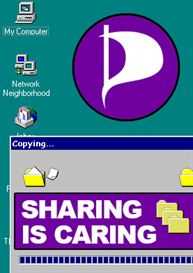A sidenote:
This FAQ page, like the rest of this website, is an act of Public Relations, which by definition inevitably seeks to manipulate the audience. While it isn’t consciously the case with this FAQ in particular, it is easy to imagine an expert in the art of public discourse manipulating the “frequently asked” questions to provide framing for the issues and concepts that is pre-approved and according to an existing narrative that unfairly limits discussion. While this particular Frequently Asked Questions page is in principle a legitimate attempt to answer common questions that are asked of the Pirate Party of Canada, we encourage critical thought on the part of readers.
-Shawn Vulliez, Political Council, Pirate Party of Canada
Where is the Pirate Party’s Platform on _________ ?
The Pirate Party of Canada’s focus is primarily on issues relating to information policy and civil liberties. We are in the process of building a more comprehensive platform, you can find more details about that here.
As a general rule, anything outside the scope of our typical platform we advocate the citizen getting access to as much relevant information as possible, and using democratic collaborative processes to build policy.
Why the name “Pirate” Party of Canada?
The Pirate Party of Canada is only the local Canadian branch of an international movement. Pirate Party of Sweden founder Rick Falkvinge expands on the name “Pirate Party” here.
Does the PPCA encourage ‘copyright infringement’?
It is not an encouragement, but an acceptance of an inevitability of the information age. The only legislative solution to the alleged problem of copyright infringement online is Internet censorship and surveillance, which is not an equitable trade off. The declining profitability of an outdated business model does not justify the wholesale surveillance of entire civilian populations. The only way for the copyright-watchers to know whether or not you’re sending the newest Top 40 song to grandma in an e-mail is for the copyright watchers to spy on your computer and grandma’s computer. This is a violation of our fundamental right to privacy, and is not worth the benefits. Industry has to adapt to this new environment.
An important distinction has to be made too between ‘Piracy’ (the free copying of data) and ‘Bootlegging’ (profiting by selling other people’s books, movies and music as your own.) The Pirate Party of Canada does not believe that piracy is a legislative problem, and that noncommercial infringement should not carry any penalty. Bootlegging is a separate issue that should be treated as such.
But how will “the artists” get paid?
This is a misleading question, because it takes for granted that artists were getting paid before the start of filesharing. The vast majority of artists are not paid for their work, and never have been. They are forced to work in other industries to fund their craft, which they do as a labour of love. For these many artists the problem is obscurity not copyright infringement.
With the advent of any disruptive innovation, there is inevitably going to be market side effects, and admittedly an extremely small and privileged minority of artists are going to experience disruptions to their typical business models. However, for those people the Internet offers many technological and social solutions to the problems raised by non-commercial filesharing which they would be wise to embrace. Here are just a few.
Indiegogo
Social Funding Model
Flattr
Monetized “likes”
Bandcamp
Free alternative distribution model for Independent Music.
If an artist is aware of all these incredible new resources and would still prefer a traditional distribution model, that is their choice to make and we would encourage consumers to respect the choice of the artists that they support.
The unfortunate reality is, however, that as nice as we are when we ask for people to not lend their DVDs to one another, share an MP3 earbud with a friend, copy files via e-mail, or use a bittorrent protocol to get media they had not paid for, these things are still going to happen.
The only way for us to truly prohibit and prevent these things from happening would be the unjust wholesale monitoring of the world’s online population.
Why is the PPCA’s platform focused primarily on digital issues? What is special about the Internet?
We are largely young, tech-savvy non-politicians who have become politicians in self-defense. The Pirate Party was originally formed in response to increasingly draconian internet legislation around the world. We want to establish that the rights to free speech, free association and privacy still apply online. The bureaucratic mismanagement of issues regarding the Internet by old guard politicians serves as an efficient rallying call for the disenfranchised, apathetic or otherwise unengaged citizens who have some investment in Canada’s future. It is especially important to keep the internet unrestricted and unmonitored because the potential for abuse of surveillance infrastructure is so high.
The information age represents a significant shift in power from the few to the many. Now individuals over media corporations have control of the narrative of public discourse. Individuals over collectives have control of the information that they are allowed to access. The connectivity of the internet is bringing about a new more politically educated, more politically active populous than ever before. Our eyes are on what is possible.
Isn’t it hopeless to try to participate in the Political system?
The First Past the Post electoral system is fraudulent, undemocratic, and serves only to protect the power of existing political hierarchies. We aim to change this. Better systems are in use around the world right now, and the PPCA supports any move towards a more equitable, proportional and effective democratic system.
Voter apathy is a huge force in Canada, particularly with young people. We aim to change this. We need younger and more diverse politicians who speak to the issues that young people care about, and we need to convince the non-voting majority that their votes can change the country.
In summary, yes, there is a tough road ahead for us, but we value a challenge.
If we can be a thorn in the side of the political establishment and affect their policy, this will be a great victory. Even seemingly minor influence, such as getting parties to re-up their legal support for quality journalism and whistleblower protection, or having parties admit to the necessity of basing public policy on verifiable evidence will be enormous strides for the political climate in Canada.
Where do your party funds come from? Is the Pirate Party influenced by the money that it receives?
Individuals who support the existing ideals of the party may donate up to $1,200 a year according to Elections Canada guidelines. No one is given extra influence based on their monetary contributions, and policy building is a completely different sector than day-to-day finances. There would be no instance of the PPCA exchanging favors for favors and compromising the integrity of our platform. Monetary gain does not influence our policies.
Where does the PPCA stand on cyberbullying, trolling, and other online cruelty?
The Pirate Party of Canada can only meaningfully weigh in on legislative issues, and we do not feel there are legislative solutions to these problems online. We oppose internet censorship and surveillance of any kind, and do not think that they could solve these problems.
Where does the PPCA stand on the hacker group Anonymous and other ‘Hacktivism’?
Anonymous is a non-homogeneous organization, and is therefore unfit to make any general statements of support or condemnation about. It is a possibility of the very nature of anonymous for someone to do something that we do not support.
Hacktivism is a byproduct of people feeling as if they have no voice or influence in public policy, and the most effective way to fight hacktivism in Canada is to provide an engaging framework for meaningful input for Canadians.
You are amazing! Can I get married to your political organization?
Unfortunately, technology has not advanced enough for you to marry our political organization. However, you may volunteer.







